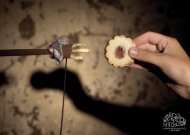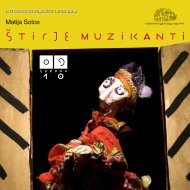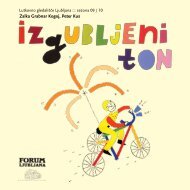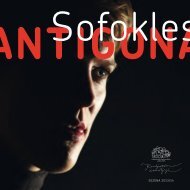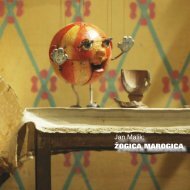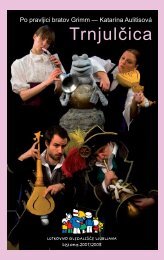Gledališki list - Ljubljana Puppet Theatre
Gledališki list - Ljubljana Puppet Theatre
Gledališki list - Ljubljana Puppet Theatre
Create successful ePaper yourself
Turn your PDF publications into a flip-book with our unique Google optimized e-Paper software.
and whom he serves, the talkative trickster lets it slip, and the duke discovers<br />
what a famous guest he hosts. He calls for Faustus immediately asking him to<br />
perform some of his magic. Kasperle looses his job again. Demon Asmodeus<br />
promises him a night watchman’s job, if he gave him his soul. Kasperle agrees<br />
— he is a puppet, and has got no soul anyway.<br />
Faustus finds no peace of mind, and has become tired of all. Mephisto brings<br />
him Helen of Troy. Faustus is enchanted. What the devil cannot do a woman can!<br />
Act V — A STREET IN WITTENBERG<br />
Faustus is disappointed with his life, and the contract with Mephisto is coming<br />
into force. The sly devil has added nights to his days of service, tricking<br />
him in this way.<br />
Night watchman Kasperle roams the streets singing his songs. Asmodeus appears<br />
before him claiming Kasperle’s soul. But the resolute trickster threatens<br />
him that he will burn his whiskers — and the frightened demon runs away.<br />
A figure walks toward Kasperle, and he recognises his former master, Faustus<br />
who owes him two salaries. Hoping that the devil would grab the wrong person,<br />
Faustus offers Kasperle his coat as payment. But Kasperle is no fool.<br />
There is no more hope for Faustus. The voice of the evil master echoes, and<br />
the door to hell opens …<br />
Matjaæ Loboda<br />
LUTKOVNO GLEDALI©»E<br />
LJUBLJANA<br />
was founded in 1948. It found its initial inspiration in various traditions which<br />
influenced Slovenian puppetry from its beginnings in the second decade of<br />
the 20th century (Milan KlemenËiË’s theatre), between the two world wars,<br />
(43 string puppet stages at Sokol gym societies; Pavliha’s stage — hand puppet<br />
theatre with the set character, jokester Pavliha, Slovenian variant of Pulcinella,<br />
Punch, Kasperle, Petrushka, etc.) to the end of World War Two (Partisan<br />
<strong>Puppet</strong> <strong>Theatre</strong>). The young theatre was caught in a labyrinth of aesthetics.<br />
Above all thanks to art director, director, actor and writer Joæe Pengov, the<br />
founder of modern Slovenian puppetry, it soon found its own expression and<br />
achieved an enviable artistic level, which it has confirmed at festivals of the<br />
international puppetry organisation, UNIMA (Bucharest 1958, Bochum 1960,<br />
Warsaw 1962), as well as by filming for German television (Pinocchio 1961, Little<br />
Witch 1968). After Pengov’s death and the switch of generations, looking<br />
for new directions was inevitable, and they brought to the theatre a number of<br />
new, prominent Slovenian writers, directors, artists and musicians, winners of<br />
the most prestigious art awards — including awards for their contributions to<br />
productions of Lutkovno GledaliπËe <strong>Ljubljana</strong>.<br />
The theatre achieved full recognition in the fourth decade of its operation<br />
when it moved to a new venue (1984) which offered new performing possibilities.<br />
The repertory broadened from soloist miniatures to spectacular<br />
productions using the widest possible array of puppeteering techniques. The<br />
era was marked by a renewed, intensified engagement in the international<br />
arena. Lutkovno GledaliπËe <strong>Ljubljana</strong> has so far made around 130 tours of 31<br />
countries on all continents, and has visited over 100 cities achieving wide<br />
acclaim and receiving numerous festival awards. It has succeeded in breaking<br />
the ice at home, taking part in theatre (non-puppetry) festivals — winning<br />
awards there, too.<br />
Recently, generations have switched again both in the theatre management<br />
and personnel. The new creative minds and genres broadened yet again the<br />
scope of programme. The twelve members of the company (with outside<br />
collaborators) put on stage eight premieres a year and give around 460 shows<br />
locally, touring Slovenia and other countries. The most attention is paid to the<br />
youngest audiences, however the theatre produces demanding shows for yo-



